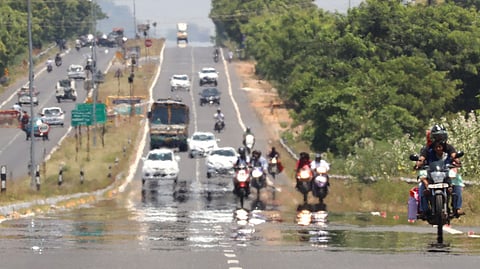Rural construction workers risk lives on highways due to poor bus connectivity
TIRUCHY: Every evening, the Tiruchy-Madurai National Highway turns into a dangerous waiting zone for scores of construction workers, who line up at key junctions like Palpannai, TVS Tollgate, and Mannarpuram, desperately waving at passing trucks and private vehicles to hitch a ride back home. Their journey back to remote villages in Tiruchy and Pudukkottai districts is marred by unreliable public transport and poor rural connectivity, forcing them into daily risks just to return home after a hard day’s work.
Despite being part of a workforce of over 2,000 daily wage labourers from villages such as Valanadu, Valanadu Kaikatti, Vembanur, Thenur, Idayapatti, Kovilpatti (in Marungapuri block), and Kodumbalur, Thennambadi, and Poyyamani (in Viralimalai block), only about 500 face this ordeal every evening. While some manage to return home by afternoon using available services, the rest are left stranded after 7 pm, resorting to flagging down lorries and load vehicles.
Other residents who reside in these same areas usually have transportation means of their own, or leave their vehicles at a spot and then board the buses, while these construction workers are either forced to walk for over a kilometre to the nearest bus stop and board buses which are less frequent to their villages or are left to stand at the highways hoping for a ride back home.
These workers often pay around Rs 20 per head for these unsafe rides, which may drop them close to or even inside their villages. In contrast, government buses, which charge Rs 35- Rs 45 and are free for women for the same route, drop them at designated stops, far away from their homes. Many buses refuse to stop at the junctions where these workers wait, despite repeated requests.
“We work hard all day, but in the evening, we have to stand on the edge of a speeding highway and hope a lorry driver will take pity on us,” said D Kumar of Agarapatti. “We are standing on bridges where accidents have already happened. Ironically, passing vehicles stop near our village, but buses don’t.”
S Kalaiselvi, a worker from Vembanur, shared similar concerns. “We’ve pleaded with bus conductors to stop at our villages, but nothing changes. We risk our lives daily.”
Activists and workers have appealed to the district administration and the Tamil Nadu State Transport Corporation (TNSTC) to improve rural bus connectivity and ensure that buses stop at key rural junctions or even inside the villages.
When contacted, a senior TNSTC official in Tiruchy acknowledged the problem. “We are aware of the issue and have encouraged workers to use government buses that reach their villages. However, many avoid them due to the ticket fare compared to private lorries. Our earlier attempts to address the situation didn’t succeed, but we will look into the matter again,” the official said.
Workers, however, argue that the solution is simple: make sure buses stop at the locations where they stand, or allow buses to enter their villages like the lorries often do.

